PROPORTIONAL AND NON PROPORTIONAL RELATIONSHIPS WORKSHEET
Subscribe to our ▶️ YouTube channel 🔴 for the latest videos, updates, and tips.
Problem 1 :
Determine if each of the following equations represents a proportional or nonproportional relationship.
(i) q = 2p + (1/2)
(ii) v = (1/10)u
(iii) t = 15d
(iv) m = 0.75d - 2
A linear relationship is a proportional relationship when y/x is constant. Otherwise, the linear relationship is nonproportional.
Problem 2 :
Determine which of the following tables represent proportional relationships.
Problem 3 :
Determine which situation is a proportional relationship and which situation is a nonproportional relationship.
Dylan makes $336 for 32 hours of work, and Angela makes $420 for 42 hours of work.
1) How much do Dylan and Angela each make per hour?
2) Is Dylan’s wage for 25 hours proportional to Amber’s wage for 42 hours? Why or why not?
Problem 4 :
This year, Andrea celebrated her 12th birthday, and her brother Carlos celebrated his 6th birthday. Andrea noted that she was now twice as old as her brother was. Is the relationship between their ages proportional? Support your answer.
Problem 5 :
Lily is considering buying books on display three different tables. Each table has one of the following signs.
Offer A : Each Book $10
Offer B : Each book 50% off.
Offer C : Each book $8 for club members (one time membership fee : $15).
What will be the total cost if Lily buys 6 books from the table whose sign indicates a nonproportional relationship?
Problem 6 :
Complete the tables below and then graph each set of data.

Problem 7 :
Determine if each of the following graphs represents a proportional or nonproportional relationship.
i)
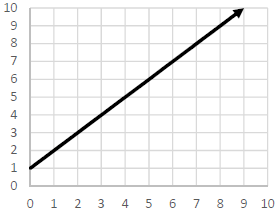
ii)
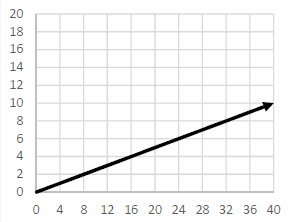
If it is a linear equation it can be written in the form y = mx + b . If it is also proportional, then b = 0 and it can also be written as y = kx .
Asnwer Key
1) i) non proportional relationship.
ii) proportional relationship and constant of proportionality is 1/10.
iii) proportional relationship and constant of proportionality is 15.
iv) not proportional relationship, because 0.75d is subtracted with 2
2)
i) proportional relationship.
ii) proportional relationship.
iii) non proportional relationship.
iv) proportional relationship.
3) 1) Dylan will make $10.5 and Angela will make $10.
2) Working rate of them are not same, it is not proportional.
4) the relationship between their ages is proportional.
5) Offer A and B are proportional and offfer C is non proportional.
6)
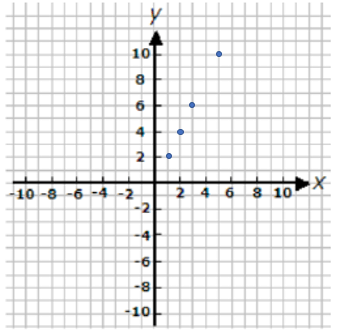
7) i) the required linear equation is y = x + 1.
ii) the required equation is y = (1/4)x.
Problem 1 :
Determine if each of the following equations represents a proportional or nonproportional relationship.
(i) d = 65t
(ii) p = 0.1s + 2000
(iii) n = 450 − 3p
(iv) 36 = 12d
A linear relationship is a proportional relationship when y/x is constant. Otherwise, the linear relationship is nonproportional.
From the Table
Problem 2 :
Determine if the linear relationship represented by each table is a proportional or nonproportional relationship.
From the Statement
Problem 3 :
Determine which situation is a proportional relationship and which situation is a nonproportional relationship.
(i) The cost for Test Prep Center A is $20 times the number of hours that you attend.
(ii) The cost for Test Prep Center B is $25 an hour, but you have a $100 coupon that you can use to reduce the cost.
From the Graph
Problem 4 :
Determine if each relationship is a proportional or nonproportional situation.
(i)
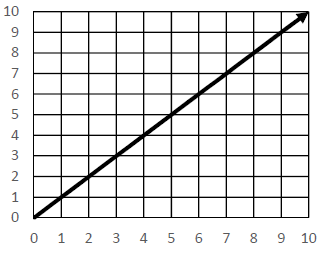
ii)
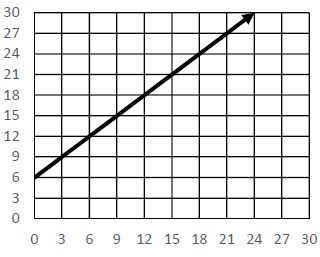
Problem 5 :
You swam for 16 minutes and completed 20 laps. You swam your first 4 laps in 2.4 minutes. How long does it take you to swim 10 laps?
Problem 6 :
Find the heart rates of yourself and your friend. Do these rates form a proportion? Explain.
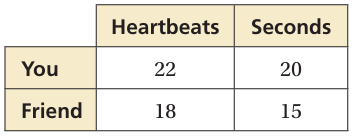
Problem 7 :
You earn $56 walking your neighbor’s dog for 8 hours. Your friend earns $36 painting your neighbor’s fence for 4 hours. Are the pay rates equivalent? Explain.
Problem 8 :
The shadow of the moon during a solar eclipse traveled 2300 miles in 1 hour. In the first 20 minutes, the shadow traveled 766 2/3 miles. How long did it take for the shadow to travel 1150 miles? Justify your answer.
Answer Key
1) i) it is a proportional relationship. Constant of proportionality = 65.
ii) it is not in proportional relationship.
iii) It is not a proportional relationship.
iv) no proportional relationship.
2) i) not in proportional relationship.
ii) it is in proportional relationship.
3) i) C = 20h
It is a proportional relationship.
ii)
C = 100 - 25h
It is non proportional relationship.
4) i) it is a proportional relationship.
ii) it is a non proportional relationship.
5) The number of laps is not proportional to the time. So, you cannot use ratio reasoning to determine the time it takes you to swim 10 laps.
6) The rates are not equal, then they are not in proportion.
7) The ratios are not equal, then they are not in proportion.
8) To travel 1150 miles, will be taking 1/2 hour.
Subscribe to our ▶️ YouTube channel 🔴 for the latest videos, updates, and tips.
Recent Articles
-
Finding Range of Values Inequality Problems
May 21, 24 08:51 PM
Finding Range of Values Inequality Problems -
Solving Two Step Inequality Word Problems
May 21, 24 08:51 AM
Solving Two Step Inequality Word Problems -
Exponential Function Context and Data Modeling
May 20, 24 10:45 PM
Exponential Function Context and Data Modeling




